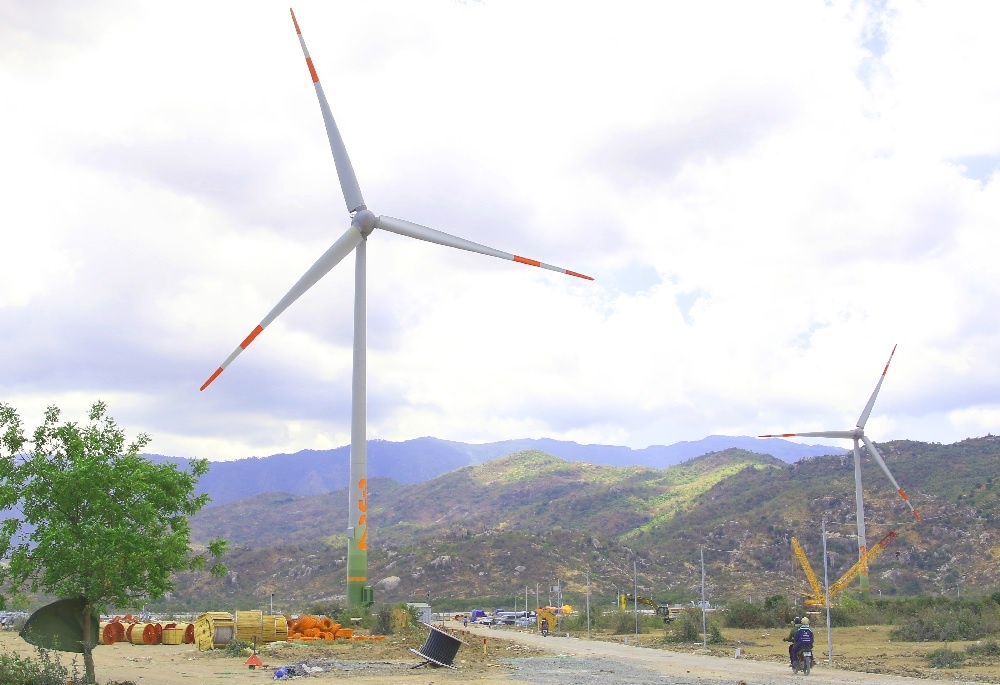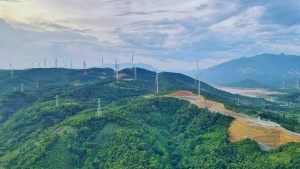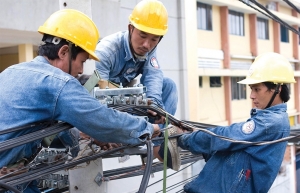Green-digital mission holds cost-saving potential
 |
| Green-digital mission holds cost-saving potential, photo Le Toan |
Samsung, the biggest foreign-invested enterprises (FIEs) in Vietnam, is expanding its procurement of renewable energy in the country. It is seeking the Vietnamese government’s support to increase the use of more renewable power for local production.
Choi Joo Ho, general director of Samsung Vietnam, made the proposal at a meeting with Vietnamese Deputy Prime Minister Tran Hong Ha last month.
“Samsung Vietnam hopes that the government will create better conditions so that it could boost renewable energy use in its production under the direct power purchase agreement (DPPA) at rational costs, in line with Vietnam’s net-zero emissions goal,” Ho said.
Truong Bui, partner and general manager of Roland Berger’s Vietnam office, said the government is advancing renewable energy through the DPPA, a key step towards a competitive electricity market.
“This allows manufacturers to choose green energy suppliers and meet growing global sustainability demands. Simultaneously, foreign companies are embracing digitalisation, integrating advanced technologies like AI and automation to enhance efficiency,” Bui said.
Leading FIEs like Samsung exemplify this dual transition, combining renewable energy procurement with digital transformation. The efforts align with Vietnam’s economic goals, positioning the country as a top destination for foreign direct investment (FDI) focused on both sustainability and innovation.
“Vietnam’s dual transition strategy will be a new driver for sustained socioeconomic growth,” Bui said. “The green transition will mitigate the environmental impact of industrialisation, ensuring long-term sustainability and compliance with global environmental standards. Concurrently, digital transformation will accelerate innovation, enhance operational efficiencies, and unlock new market opportunities.”
This strategic approach will also enable Vietnam to ascend the global value chain, further reinforcing its competitive advantage in international markets, Bui added.
Another example of dual transition is led by Swedish packaging company Tetra Pak, which announced an additional €97 million ($104.2 million) investment to expand its packaging material production facility in the southern province of Binh Duong in May. The factory applies the latest, most-demanding environmental standards and is the first packaging production factory in Vietnam to achieve the globally recognised LEED Version 4 Gold Certification, helping the factory to save two million litres of water and decrease 4,000 tonnes of CO2 emissions per year.
The company also installed nearly 6,000sq.m of solar panels on the roof of the Binh Duong factory to generate approximately 1,900MWh of renewable energy each year, and helping to reduce over 700 tonnes of CO2 emissions.
Eliseo Barcas, managing director and president of Tetra Pak Vietnam, said that with the latest expansion, the facility will have the capability to produce new and innovative packaging formats. The upcoming changes will be implemented in accordance with its dedication to environmental responsibility and corporate stewardship, ensuring sustainability standards are upheld throughout the process.
“We aim to build on this foundation, with the expansion continuing to integrate the latest technologies and best-in-class production standards focusing on food safety, quality and sustainability,” Barcas said. “Our innovation pathway is driven by renewability and recyclability, ensuring the decarbonisation and circularity of materials and addressing the need for sustainable food packaging.”
Stephen Olson, a visiting fellow at the Institute of Southeast Asian Studies, told VIR that companies like Samsung and Tetra Pak are demonstrating that they recognise both the practical and larger societal imperative to address the dual transition.
“Both prongs of the dual transition – green and digital – hold the potential to deliver cost savings to FDI providers while at the same time demonstrating a willingness to positively partner with the government to achieve shared goals. I expect to see this trend continue and additional examples of business and government supporting each other in the dual transition,” Olson said.
Moving Vietnam more firmly into the digital economy will also bring big benefits to the country’s small- and medium-sized enterprises. Global markets will become increasingly open and the move to greater sustainability will serve Vietnam well, both from an economic and social perspective, he added.
Under the DPPA, the Vietnamese government is allowing renewable energy developers to sell directly to consumers and bypass the state electricity provider. This is a good example of a government that is putting its money where its mouth is, Olson said.
“It is probably also an indication that the government recognises that there could otherwise be some challenges in ensuring that FDI providers have sufficient access to the required utilities and infrastructure in order to justify establishing or expanding facilities in Vietnam,” Olson noted. “To the extent the dual transition can be successfully executed, it will improve Vietnam’s attractiveness as a destination for FDI.”
 | DPPA approval a win for clean energy The US Department of State’s Bureau of Energy Resources (ENR) applauded the Vietnamese government's approval of a direct power purchase agreement (DPPA) on July 3, a significant milestone towards achieving net-zero emissions by 2050. |
 | Feasibility is a must for successful DPPA mechanism A July government decree permits many kind of renewable energy projects to engage in direct power purchase agreements without using Vietnam Electricity transmission line. Tran Dang Khoi, general director of Hero Future Energies Vietnam LLC under Hero Group, told VIR’s Oanh Nguyen about the impact of the policy on renewable energy firms and offered some proposals. |
 | DPPA paves the way to energy transition Direct power purchasing mechanisms pave the way for manufacturers to accelerate their emission reduction strategies by expanding the procurement of renewable energy. |
What the stars mean:
★ Poor ★ ★ Promising ★★★ Good ★★★★ Very good ★★★★★ Exceptional
Related Contents
Latest News
More News
- Vietnam, New Zealand seek level-up in ties (February 19, 2026 | 18:06)
- Untapped potential in relations with Indonesia (February 19, 2026 | 17:56)
- German strengths match Vietnamese aspirations (February 19, 2026 | 17:40)
- Kim Long Motor and AOJ Suzhou enter strategic partnership (February 16, 2026 | 13:27)
- Haiphong welcomes long-term Euro investment (February 16, 2026 | 11:31)
- VIFC in Ho Chi Minh City officially launches (February 12, 2026 | 09:00)
- Norfund invests $4 million in Vietnam plastics recycling (February 11, 2026 | 11:51)
- Marico buys 75 per cent of Vietnam skincare startup Skinetiq (February 10, 2026 | 14:44)
- SCIC general director meets with Oman Investment Authority (February 10, 2026 | 14:14)
- G42 and Vietnamese consortium to build national AI infrastructure (February 09, 2026 | 17:32)

 Tag:
Tag:
















 Mobile Version
Mobile Version